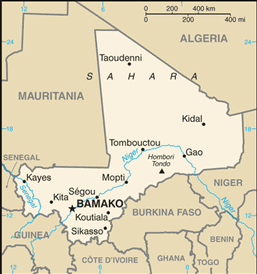Mali’s Tuareg insurgents stepped up fighting after the military coup last month and now have declared independence in the remote north for which they’ve fought for decades. They have thus announced a ceasefire and a partitioning of the country in two.
“We, the people of the Azawad,” they said in a statement published on the rebel website, “proclaim the irrevocable independence of the state of the Azawad starting from this day, Friday, April 6, 2012.”
 Whether fighting will cease is not yet clear. The leaders of the military coup are holding onto power in the south – even declaring sharia law – and neighboring West African countries, having already imposed sanctions, are meeting to decide on a possible military intervention to restore civilian rule.
Whether fighting will cease is not yet clear. The leaders of the military coup are holding onto power in the south – even declaring sharia law – and neighboring West African countries, having already imposed sanctions, are meeting to decide on a possible military intervention to restore civilian rule.
Despite the instability – caused essentially by the NATO intervention in Libya last year – the United States has continued portions of economic aid to Mali. If Washington doesn’t officially categorize the rebel power-grab a military coup, they’re legally allowed to continue sending money. In addition, small teams of U.S. troops remain in the country, reportedly “on stand-by.”
“Mali has never experienced such a situation,” Mali’s U.N. Ambassador Omar Daou told the Security Council. “Our people are divided. Our country is threatened with partition.”
The Western powers seem confused by the situation, having to denounce both the Tuaregs and their rivals who led the military coup. “A unilateral declaration of independence that is not recognized by African states means nothing for us,” said French Defence Minister Gerard Longuet, a position the European Union agrees with.
“We will certainly not accept this declaration. It’s out of the question,” said Richard Zinc, the head of the European Union delegation in Bamako.
Declarations of ceasefires, independence, and who seized control in the north and south often do not match the reality on the ground, however, where fighting and looting continue to cause fear and confusion. “I heard the declaration but I’m telling you the situation on the ground. We barely see the NMLA. The people we see are the Salafis,” said one resident in the north. “I can’t tell which group they are exactly, but we know they are the Islamists because of their beards. They are the people in control of Gao.”


